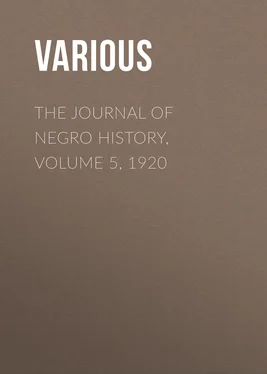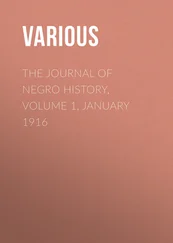Various - The Journal of Negro History, Volume 5, 1920
Здесь есть возможность читать онлайн «Various - The Journal of Negro History, Volume 5, 1920» — ознакомительный отрывок электронной книги совершенно бесплатно, а после прочтения отрывка купить полную версию. В некоторых случаях можно слушать аудио, скачать через торрент в формате fb2 и присутствует краткое содержание. Жанр: foreign_antique, periodic, История, foreign_edu, на английском языке. Описание произведения, (предисловие) а так же отзывы посетителей доступны на портале библиотеки ЛибКат.
- Название:The Journal of Negro History, Volume 5, 1920
- Автор:
- Жанр:
- Год:неизвестен
- ISBN:нет данных
- Рейтинг книги:4 / 5. Голосов: 1
-
Избранное:Добавить в избранное
- Отзывы:
-
Ваша оценка:
- 80
- 1
- 2
- 3
- 4
- 5
The Journal of Negro History, Volume 5, 1920: краткое содержание, описание и аннотация
Предлагаем к чтению аннотацию, описание, краткое содержание или предисловие (зависит от того, что написал сам автор книги «The Journal of Negro History, Volume 5, 1920»). Если вы не нашли необходимую информацию о книге — напишите в комментариях, мы постараемся отыскать её.
The Journal of Negro History, Volume 5, 1920 — читать онлайн ознакомительный отрывок
Ниже представлен текст книги, разбитый по страницам. Система сохранения места последней прочитанной страницы, позволяет с удобством читать онлайн бесплатно книгу «The Journal of Negro History, Volume 5, 1920», без необходимости каждый раз заново искать на чём Вы остановились. Поставьте закладку, и сможете в любой момент перейти на страницу, на которой закончили чтение.
Интервал:
Закладка:
144
Documents printed by order of the Senate, 1861 , No. 96, p. 47.
145
Ibid. , pp. 73-74.
146
Documents printed by order of the Senate, 1861 , No. 96, p. 84.
147
Documents printed by order of the Senate, 1861 , No. 96, p. 101.
148
Ibid. , p. 109.
149
Ibid. , pp. 131-132.
150
Massachusetts Acts of 1884, 1890, 1892, and 1893.
151
Massachusetts Acts of 1869 , Chapter 463.
152
"A method was also provided through which his title might be established. This was through Commissioners which were to be appointed by the Probate Court who were to act under the direction of the Court and determine all necessary questions and make their report from which the Court could make its order or decrees. Any person who deemed himself aggrieved had the right to appeal to the Supreme Judicial Court. The right of the Indians became vested and forcible the moment the statute took effect." See a statement from the present Attorney General of Massachusetts, dated December 1, 1919.
153
"Section 5, chapter 463 of the Acts of 1869 provided that the general agent of the board of state charities shall take charge of the house, and all property connected therewith, in the town of Webster, belonging to the Commonwealth and permission was given him to lease the same to persona heretofore known as members of the Dudley tribe of Indians, upon terms substantially like those upon which they have heretofore occupied it; or to sell the same at public auction under the direction of the state board of charities and pay the proceeds of such lease or sale into the Treasury of the Commonwealth." Statement of present Attorney General of Massachusetts, submitted December 1, 1919.
154
Samuel A. Drake, History of Middlesex County. Massachusetts , pp. 194, 280.
155
John W. Cromwell, The Negro in American History , 98-103.
156
These facts were obtained from Mr. Butler himself.
157
This list was obtained from the office of the Attorney General of Massachusetts.
158
Compiled by Monroe N. Work.
159
Beverly, History of Alabama , 202, 208.
160
Beverly, History of Alabama , 202, 208.
161
Not returned for the 1875-1876 session.
162
Furnished by Major John R. Lynch, May 19, 1915.
163
Ibid. , pp. 481-862.
164
Reynolds, Reconstruction in South Carolina , pp. 76-79.
165
In 1895 South Carolina again revised her constitution. In the convention held for this purpose there were found Negro delegates, viz.: Thomas E. Miller, L. R. Reed, Robert Smalls, W. J. Whipper and James Wigg, all from Beaufort County. Smalls and Whipper had been delegates in the 1868 convention. (Reported by H. H. Wallace.)
166
Furnished by Mr. H. A. Wallace, a former page in the South Carolina House of Representatives in the Reconstruction Period.
167
Furnished by H. A. Wallace, a former page in the South Carolina House of Representatives in the Reconstruction Period.
[21] Names marked with asterisk not in lists given in Reynold's Reconstruction in South Carolina , pp. 107-108, 394-396.
168
Reynolds, Reconstruction in South Carolina , pp. 106-108.
169
Reynolds, Reconstruction in South Carolina , pp. 394-396.
170
Furnished by H. A. Wallace, a former page in the South Carolina House of Representatives in the Reconstruction Period.
171
Ibid.
172
Ibid.
173
George H. White, North Carolina, member of 55th and 56th Congresses, as the last Negro member. (Editor.)
174
He was a page in the South Carolina House of Representatives in the Reconstruction Period.
175
There were no colored members of the Tennessee Senate.
176
1868, 1870, see North Carolina list, Pasquotank County.
177
This account was taken from James G. Thompson's Papers by his daughter, Caroline B. Stephen, of Washington, D.C. Special Correspondence of the New York Tribune .
178
This dissertation was in 1917 submitted to the Faculty of the Graduate School of Arts and Literature of the University of Chicago, in candidacy for the degree of Master of Arts by Henry S. Williams.
The following original sources were used in the preparation of this manuscript: Reports of Superintendent of the Public Schools of the State of Missouri , 1866-1917; Session Laws of the State of Missouri, 1866-1913; Reports of the U.S. Commissioner of Education, 1870-1916; U.S. Census Reports , 1860-1910; The Missouri Republican , 1866-1870; Journal of Education , Vols. I and II (St. Louis, Missouri, 1879); Revised Statutes of Missouri , 1879-1909; Proceedings and Occasional Papers of the Slater Fund (Baltimore, Maryland); Missouri Historical Society Collections , Vols. II and III; Asa E. Martin, Our Negro Population (Kansas City, Missouri, 1913); N.H. Parker, Missouri as it is in 1867 (Philadelphia, 1867); Am. Annual Cyclopedia , 1870-1877; Annual Reports of the Board of Education of St. Louis , 1867-1916; Annual Reports of the Board of Education , of Kansas City, 1870-1915.
The secondary sources consulted follow: Lucian Carr, American Commonwealths, Missouri a Bone of Contention (Boston, 1894); C.R. Barnes, Switzler's Illustrated History of Missouri (St. Louis, 1889); W.B. Davis, and D.S. Durrie, An Illustrated History of Missouri (Cincinnati, Ohio); S.B. Harding, Life of George R. Smith (Sedalia, Missouri, 1904); W.E.B. DuBois, The Negro Common School (Atlanta, Georgia); C.L. Butt, History of Buchanan County (Chicago, 1915); H.A. Trexler, Slavery in Missouri , 1804-1865 (Baltimore, Maryland, 1914); C.G. Woodson, The Education of the Negro Prior to 1861 , (New York, 1915); History of Calloway County (St. Louis, 1884); History of Cole, Moniteau, Morgan, Benton, Miller, Maries, and Orange Counties , Missouri (Chicago, 1889); J.T. Shaff, History of St. Louis City and County (Philadelphia, 1885); R.A. Campbell, Campbell's Gazetteer of Missouri (St. Louis, 1875); Encyclopedia of the History of St. Louis (New York, 1889); Missouri Historical Review , Vols. I, II, IV, VI, VII, and IX (Columbia, Missouri); The Negro Year Book (Tuskegee, Alabama, 1917).
179
Parker, N.H., Missouri as it is in 1867 , p. 424.
180
Woodson, C.G., Education of the Negro Prior to 1861 , p. 159-168.
181
Missouri State Convention of 1865 , Art. IX.
182
Laws of State of Missouri , Adjourned Session 23d General Assembly, p. 177.
Читать дальшеИнтервал:
Закладка:
Похожие книги на «The Journal of Negro History, Volume 5, 1920»
Представляем Вашему вниманию похожие книги на «The Journal of Negro History, Volume 5, 1920» списком для выбора. Мы отобрали схожую по названию и смыслу литературу в надежде предоставить читателям больше вариантов отыскать новые, интересные, ещё непрочитанные произведения.
Обсуждение, отзывы о книге «The Journal of Negro History, Volume 5, 1920» и просто собственные мнения читателей. Оставьте ваши комментарии, напишите, что Вы думаете о произведении, его смысле или главных героях. Укажите что конкретно понравилось, а что нет, и почему Вы так считаете.












